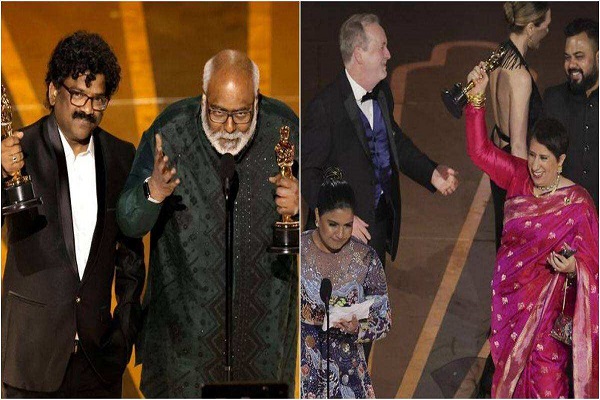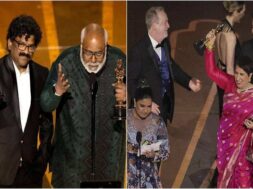
Wins at Oscars 2023 showcase depth of diversity and inclusion in the country
India’s recent success at the 95th Academy Awards with two awards for Best Original Song for the film RRR, ‘Naatu Naatu’, and Best Documentary Short Film for The Elephant Whisperers is a significant achievement for the country. The films share a common thread: Amplifying India’s global communication on diversity and inclusion and thereby, further enhancing Indian cinema’s soft power in unique ways.
The Indian cinema industry has contributed immensely to the world’s understanding of India. Actors like Raj Kapoor, Irrfan Khan, Shah Rukh Khan, Aamir Khan, Manoj Bajpayee, Anupam Kher, Samantha Ruth Prabhu, Dhanush, Mohanlal, Deepika Padukone, Yash, and creators like Satyajit Ray, Rajamouli, Raj & DK, Basil Joseph, Prashant Neel, and many more, have transcended borders today. They have been great mediums to communicate through cinema in never-before-seen ways.
Movies like Dangal and 3 idiots have been hits with Chinese youth because they were relatable and local in content, but made for a universal audience. Fans from Japan make it a point to attend the first day’s first show of any movie with southern superstar Rajinikanth. Indian cinema has also benefited from talent from outside, say Jewish people. For example, the documentary Shalom Bollywood showcases this brilliantly. Indian cinema’s achievements in attracting the world are evident to anyone and everyone. Cinema is a great communication tool that outweighs any partisanship. It is premised on creativity and free speech.
The South Korean movie, Parasite, highlighted the deep divisions of social inequalities in Korean society. It resonated tremendously with audiences globally. Academic case studies that have explored the impact of Indian cinema abroad have outlined how Indian cinema made with a local “flavour” has resonated with foreign audiences.
In contemporary times, India has taken nascent but concrete steps towards communicating globally through cinema. Stories such as RRR (Telugu), Kantara (Kannada), Sairat (Marathi), Pariyerum Perumal (Tamil), Mandela (Tamil), and Asuran (Tamil) and films like The Elephant Whisperers from a documentary perspective are evidence of this healthy, growing trend. These stories are varied in their scope but do effectively communicate localised stories of assertion, sustainability, and justice. Indian filmmakers like Bharat Bala have taken to the virtual medium, YouTube, to bring the Virtual Bharat campaign to global viewers, showcasing short eight to 10-minute videos of human stories of India that are most often unheard and unseen. The inspiring stories of the Ramnami community from Chhattisgarh and the story of the tribal poet Haldhar Nag (with a terrific voiceover from Gulzar) are a great addition to the Virtual Bharat series.
RRR has already garnered great reception in the West, particularly in the US, where it has won the Golden Globe Award for ‘Naatu Naatu’ and the New York Film Critics Circle Award, Critics Choice Movie Awards, etc. before winning the Academy award. The movie also did well with Japanese audiences and stars from the famous K-pop band, BTS, like Jungkook, and the South Korean ambassador to India, Chang Jae-bok, and his embassy staff were seen grooving to ‘Naatu Naatu’ from RRR recently on social media.
RRR brings to the silver screen the stories of two tribal heroes, Komaram Bheem and Alluri Sitarama Raju, who played important roles in tribal-led movements in Indian history. While the film is fictional, it sheds some light on the lives of these real freedom fighters who advocated for the rights of indigenous tribal communities, emphasising the importance of ‘jal, jungle, and jameen’ (water, forest, and land) for tribal brethren. The film has faced criticism, with some questioning the need to revisit history, but it has succeeded in sparking interest in these important figures and encouraging young people to learn more about their contributions.
The Elephant Whisperers won the Best Documentary Film award at the 95th Academy Awards. Directed by Kartiki Gonsalves and produced by Guneet Monga, the film showcases how forest rangers and the Kattunayakan tribal community in Tamil Nadu work together to live in harmony with nature and wild elephants. It emphasises the need to respect nature and seek interconnectedness in everything we do, encouraging viewers to appreciate the importance of sustainability.
By communicating the importance of India’s tribal communities and exploring contemporary lessons, such as sustainability, in a unique and simple manner, films like this contribute to India’s global communication of its strengths in diversity and inclusion. Indian cinema has received recognition in the past at the Academy Awards, but these recent wins are special because they advance Indian interests in liberty, equality, fraternity, and justice. They aim to enable social cohesion and bridge social divisions.
The Government of India, with the help of non-state actors, would do well to holistically evaluate the impact of Indian cinema globally through monitored research studies. But in conclusion, the films RRR and The Elephant Whisperers represent India’s strengths in diversity and inclusion, breaking away from stereotypes and showcasing the country’s soft power to the world more persuasively.
(Written by Sudarshan Ramabadran and Guru Prakash Paswan)
(Ramabadran is an author and researcher. Paswan is National Spokesperson, BJP. Views are personal)













